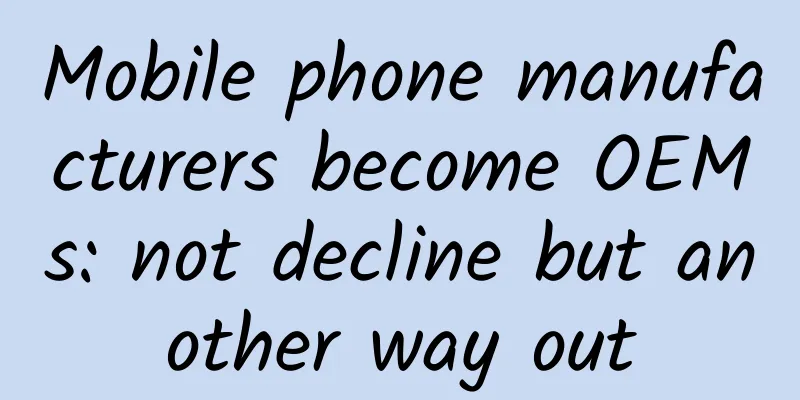|
Lenovo has just denied the news of returning to OEM, and ZTE has confirmed that it will be the OEM for the new generation of Yota Phone. With the saturation of the domestic mobile phone market, many old mobile phone manufacturers are facing the dilemma of low production capacity utilization, and OEM has become one of the attempts to adjust their strategies.
OEMs give people the impression that they have low profits. The series of reports at the beginning of this year about the reshuffle of small and medium-sized OEMs in China made people shudder at the word OEM. Most people mistakenly believe that mobile phone manufacturers' return to OEM is an important sign of decline. Perhaps this is the biggest taboo for Lenovo, which is undergoing a restructuring in its mobile phone business. However, is it really a shameful thing to become an OEM? Or even the last resort for mobile phone manufacturers?
Let’s first take a look at the actual situation between mobile phone manufacturers and OEM factories.
Foxconn is the world's largest independent foundry. In addition, there are BYD, Pegatron, Inventec, and a large number of small and medium-sized foundries in Dongguan, Shenzhen and other places. Due to the limitations of supply chain and production costs, Apple, Samsung, Nokia and others entrust foundries to produce in the form of OEM. Even HTC and Huawei, which have strong production capacity, have begun to outsource the production of some products. The highly developed foundries have driven the development of the domestic mobile phone industry. The rise of Internet mobile phone brands such as Xiaomi and LeTV and the strict control of costs have made great contributions to the foundries. In addition, the rise of wave after wave of price wars has also forced many domestic mobile phone brands to embrace the wave of OEM.
However, the entire foundry industry chain has not seen the dividends brought by the rising sales of mobile phones. According to media reports, in December 2014, many foundry companies from upstream touch screens to complete machine foundry stopped production and closed down. The reason is nothing more than the meager profits of foundry and the decline in domestic mobile phone sales. Some people have predicted that when an industry has matured, those companies that lack innovation, have weak brand influence and have an imperfect ecological chain will eventually be eliminated. While the foundry industry is facing a reshuffle, foundry giants such as Foxconn are also desperately trying to get rid of the hat of foundries and have made many attempts in e-commerce, independent brands, finance and other fields.
But from the perspective of mobile phone manufacturers, the picture is quite different.
When the lethality of cost performance is getting weaker and weaker, domestic mobile phone manufacturers began to create gimmicks with craftsmanship and design, and choosing which foundry to use has become a capital for bragging. As a result, Foxconn, as Apple's exclusive foundry, is naturally favored by domestic mobile phone brands. This also brought a series of problems. First of all, Apple occupied nearly half of Foxconn's orders, which directly led to insufficient allocation of production lines of other brands, and then led to low yield rate and limited production capacity. Perhaps this is one of the reasons for the shortage and hunger marketing of Internet mobile phones such as Xiaomi. The final result is that mobile phones produced by small and medium-sized foundries have guaranteed shipments to a certain extent, and have become the main source of sales for these mobile phone brands. Whether it is Xiaomi or Meizu, its main sales are still the cheap Redmi and Meizu Blue series. Even Luo Yonghao, who has feelings, has to release Nut phones to satisfy his hunger.
A strange phenomenon is that with the saturation of demand in the domestic mobile phone market, the sales growth of Internet mobile phone brands has generally declined, while OPPO and vivo, which are relatively conservative and have insisted on independent production from the beginning to the end, have achieved impressive sales performance in the past two years. In addition to the sky-high advertising fees and the perfect agent system, it is closely related to the company's own factories. Compared with the online channel scalpers who hoard goods despite repeated bans, the perfect offline channels are more controllable than the Internet channels, and of course the requirements and control of production capacity are higher.
At present, almost all manufacturers are trying to copy the model of online and offline dual-channel development, or trying the O2O model. After 2015, D.Phone became the new favorite of many mobile phone brands, and mobile phone experience stores of all sizes also moved from first- and second-tier cities to third- and fourth-tier cities. In this process, mobile phone manufacturers need to have stronger control over product production, after all, many consumers in the offline market will choose to buy after seeing the goods. ZTE and Huawei are competing to build "super factories" in Xi'an, and Coolpad, Lenovo and others have also formed their own production systems. Xiaomi and other manufacturers are also stepping up their control over the supply chain, and the possibility of acquiring or acquiring a foundry in the future is not ruled out.
Let's turn the topic back to whether mobile phone manufacturers should manufacture for other brands when they have surplus production capacity. In fact, there are already many precedents in China. OnePlus, which was born from OPPO, chose to have its old company manufacture its two generations of products. It was previously reported that Ding Lei wanted to find Coolpad to manufacture mobile phones. Google's new Nexus phone was manufactured by Huawei, and now there is news that ZTE will manufacture Yota Phone. In foreign countries, although Samsung and Apple are mortal enemies in the mobile phone market, all generations of Apple processors are manufactured by Samsung, and Samsung is also a component manufacturer for Apple Watch. OEM is just a common thing.
Many domestic mobile phone brands claim to be the Chinese Apple. Looking back, perhaps "Samsung" is easier to imitate, and many domestic mobile phone manufacturers are indeed following Samsung's path. A perfect example is that when Samsung's mobile phone sales fell sharply, it was still able to recover its declining performance through the mobile phone supply chain industry. Samsung has its own production plants and also serves as a research and development base. If domestic mobile phone manufacturers are really going to face a cold winter, choosing OEM in the case of surplus production capacity is a good option. First, it avoids large-scale layoffs, thereby maintaining the brand image to the greatest extent. Second, it can alleviate the capital winter encountered by the company. Third, it helps the company to stay at the forefront of mobile phone production and maintain advanced production technology and processes, which is also a reflection of the company's value.
Even if it becomes a foundry, it is another way out for mobile phone manufacturers. According to IDC data, Lenovo's mobile phone delivery volume in the second quarter fell by one-third year-on-year. Perhaps Lenovo's denial of the foundry business is just a fear of media misinterpretation. However, if Lenovo refuses to use foundry to overcome the crisis in order to restructure its mobile phone business without being affected by negative news, its future may be in jeopardy.
As a winner of Toutiao's Qingyun Plan and Baijiahao's Bai+ Plan, the 2019 Baidu Digital Author of the Year, the Baijiahao's Most Popular Author in the Technology Field, the 2019 Sogou Technology and Culture Author, and the 2021 Baijiahao Quarterly Influential Creator, he has won many awards, including the 2013 Sohu Best Industry Media Person, the 2015 China New Media Entrepreneurship Competition Beijing Third Place, the 2015 Guangmang Experience Award, the 2015 China New Media Entrepreneurship Competition Finals Third Place, and the 2018 Baidu Dynamic Annual Powerful Celebrity. |










